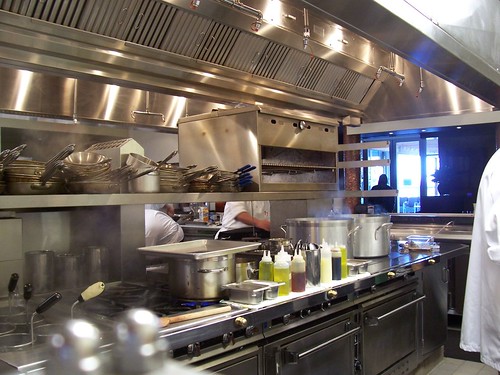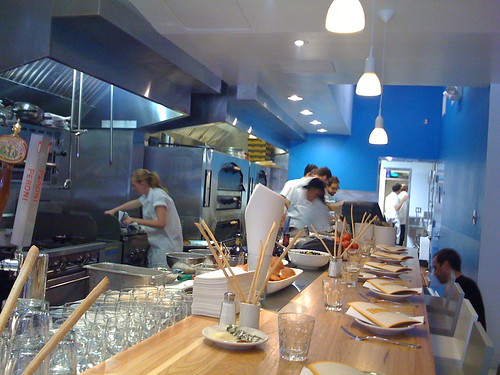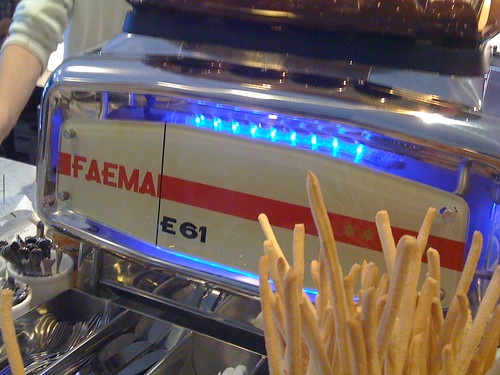
Teaching someone how to sautee is very, very difficult. Working quickly, flipping pans, searing fish--these are the easy parts. Controlling your heat, working efficiently, communicating--these are the hard parts. Strangely, as I came up as a sautee cook, none of these lessons were being taught to me. After a summer of working the five AM pastry shift, I was being brought back to the hot line. Being in pastry had been good for me--after curdling creme anglaise and burning profiteroles enough times, I had honed my technique down to a point where little time was wasted, and no detail was overlooked. My chef either saw talent in me, or was desperate for new blood on the line. He paired me with T, a 40 something journeywoman cook with a gruff demeanor and a hot temper. Most of the other cooks showed her a good deal of respect--not just because she was older, but because she had been holding down the busiest station on the line since the restaurant opened. Now it was my turn.
"Hold your pan like this, and you've kinda got a deep fryer." I was watching T cook crab cakes--a huge seller on that menu. They were gently cooked in a beautiful new all-clad pan, in grapseed oil, then warmed through in the oven. Getting them right was hard--too much breading and they burned, too wet and they wouldnt brown, too loosely packed and they fell apart. T was showing me shortcuts--but in her mind this was just the way it was done.
"You can sear off five orders of crab cakes at a time, then just heat them up when an order comes in."
"But chef doesn't want us to..."
"Well if you want your station to go down, then I dont give a fuck." She stormed down the line, then back, then down to the walk-in, then back.
"Can you help me with the scallop..."
"Get out of the way." She shoved me aside and cooked a couple of orders, saying nothing to me.
"There, now its your turn."
Any questions about technique, or the whys of cooking were met with a short, angry response--like I was stupid for even asking. I struggled through my shifts in the following weeks, and when the chef caught me searing off more crab cake orders than I had on fire, he went crazy.
"Since when do we sear off more orders than we have on fire?!?"
"Um, that's the way I was trained Chef."
As soon as those words crossed my lips, I came the realization that my training up to this point had been a bit of a waste. All of those questions I had been asking had been ignored because T didnt know the answers. All of the short cuts came because she didnt know any other way to keep up. Such an epiphany is great for a cook, but it doesnt get them out of the weeds in that moment. It would mean many hard nights with my Chef literally standing over my shoulder, watching every movement, screaming at me to re-fire the second I did something wrong. (despite the yelling, at least he was telling me where I was making mistakes) I scoured cookbooks, trying to gather as much information on technique as I could. T glared at me every night from then on--after all, I was the culinary school punk who had outed her as a bad trainer. Eventually she left, and not long after that I moved into her old lead cook position.
Training a cook has greater ramifications than just running a good or bad service. You're passing on hundreds of years of culinary tradition when you teach someone. You're leaving a part of yourself with that cook. If you do it right, the cook will remember the lessons you taught them. If you do it wrongly, the cook will only remember you. As the teacher, its not enough to just show technique--you have to teach how to communicate--and how to be aware in every moment. When you start to get good, its like time and space slow down for you. You're no longer frantic. You are in control. And its your duty to pass the right lessons on.
notes:
- out the door spring rolls are worth the extra money
- pizzaria delfina opened on California street--a quick bike ride from my apartment. eating there was fun--there was so much nervous energy in the room they probably couldve powered the whole block with it. the food was exceptional (best. tripe. ever.) so was the espresso from the e61.


- most of you were wrong. the correct answer was Heart.
- when your adrenaline rush meets your caffiene rush, it will either be beautiful, or you will want to throw up. sometimes both.
- whats worse--mental or physical fatigue? does one lead to the other?
- san francisco, I love you.



